Cartwright Group, Grocontinental, Reflex Vans, Renault Trucks and R2C Online all find themselves vying for the Innovation Award, sponsored by Goodyear, when the Motor Transport Awards take place at the Grosvenor House Hotel in London on 4 July.

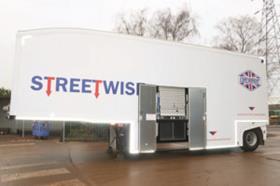
Cartwright impressed judges with how streetwise it is, with its clever trailer of the same name. The majority of retail outlets in towns and cities lack dedicated loading areas, and many receive deliveries through the front door. This blocks traffic and it can take a driver up to an hour to remove one third of the goods from a 26-tonne rigid using a traditional tail-lift to off-load roll cages. Finding space for a rear-mounted tail-lift to operate can also be challenging.
Rather than a tail-lift, Streetwise trailers have a pair of doors each side of the central well. When the vehicle arrives at its destination, the central third of the floor is lowered to street level, with a hydraulic ramp allowing level access to the pavement so the driver can easily roll-off or roll-on cages to whichever side is more convenient.
“Streetwise has the potential to be a game trailer for multi-drop delivery requirements,” our panel of judges said.
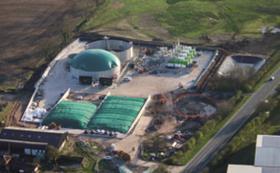
The sun doesn’t always shine, so despite having installed solar panels on its warehouse, Grocontinental was still looking at a way to secure its energy supply without increasing its carbon footprint. The solution for the Shropshire-based haulier to the food industry was an anaerobic digester. Lovingly described as a concrete cow, as it needs to be fed with energy crops, slurry, food and amenity waste and kept at the right temperature to produce biogas, CHP engines then convert the gas into heat and electricity.
Last winter the digester’s output provided 100% of the energy required by Grocontinental’s 35-acre site. During warmer months, when the warehouse’s refrigerators have to work harder, the output is expected to cover 70% of requirement.
Judges were impressed by the company’s long-term approach evident in installing the digester for the not inconsiderable sum of £10m.
“This is an ambitious plan brought to fruition,” said one of our judges.
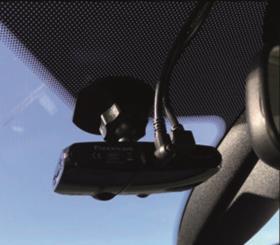
Van rental firm Reflex Vans has taken a pioneering approach to technology in its vehicles in a bid to increase clients’ safety. Normally when renting a van firms are effectively ‘driving blind’ compared with their safety-specified owned vehicles. To address this, Reflex Vans offers a range of equipment, much of which is fitted as standard. This includes forward- and rear-facing cameras, driver sleepiness alerts and access to a driver risk management programme.
“We believe that just because a company is using a rental vehicle, it shouldn’t have to leave safety behind,” Reflex Vans said.
Judges identified that while the products aren’t innovative individually, bringing them together in this manner for rental customers certainly was. “The results are strong, as Reflex has identified a market and brought something genuinely new to it,” they said.
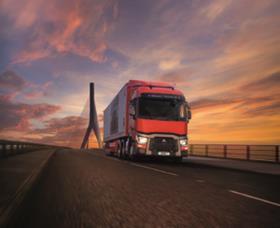
The HSE highlights incidents of truck runaways far too regularly as part of its efforts to educate drivers and employees about the risks they face. While there have been third-party and retro-fit applications to address this potentially deadly problem, Renault is the first OEM to offer an automatic handbrake as a factory-fit option.
Renault renewed its model ranges in 2013 and with the vehicles came a number of safety and new features, one of which, the electronic park brake, was critical to this innovation. The outcome was an enhancement of the core safety specification of the range to include a locally configured electronic override system, the anti-runaway automated park brake. The key innovation in the application is in taking an existing passive safety system, in this case the electronic park brake, and configuring it in such a way as to provide a specific solution to a determined safety risk. The system comprises a range of software and hardware changes to ensure that the brake will engage in either of two scenarios; if the truck is in neutral and the park brake is not engaged when the driver’s door is opened, and if the truck is in gear but park brake not engaged when the driver’s door is opened.
“Why wouldn’t you have it?” asked one of our judges.
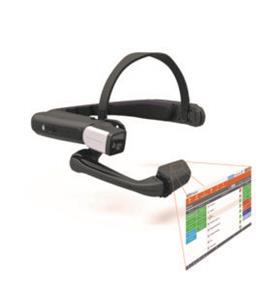
R2C Online’s futuristic application is based around wanting to free a workshop technician’s hands while keeping them connected to the tablet they require to perform vehicle diagnostics, speeding up the working process. With experiments such as Google Glass and Amazon’s Echo smart speaker providing illustrations of systems where commands do not require manual input, R2C set to work and came up with a headset that can be used handsfree. The companion software allows job sheets to be read to the technician, advice can be sought in realtime, and photos attached for defect reporting with documents added to a secure digital document file.
“An exceptional submission,” said one of our judges. Another judge added: “This is a very smart concept and should realise significant increased efficiencies throughout the industry.”










